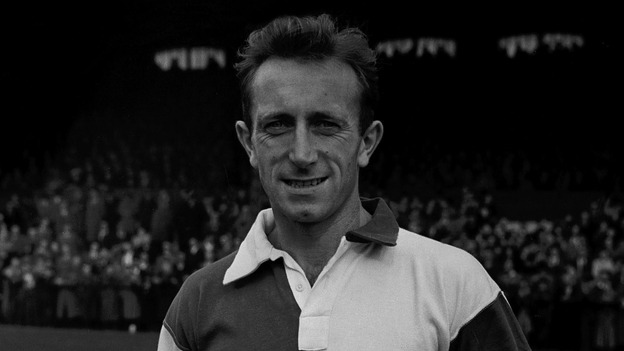Article features some information sourced by the Bristol Rovers History Group

Described as a humble and pleasant man by those who met him, Petherbridge was a reliable and critical cog in the Rovers machine and, at twenty-three, became the youngest man to be granted a benefit game for the club.
This record can be complimented by an illustration of the right-winger’s consistency in the quarters, with Petherbridge scoring at least once for Rovers in each of the first sixteen post-war League seasons.
Brought up in Bristol, the winger has some phenomenal records to his name. He is one of only three men to have played for Rovers more than fifteen years after his club debut, only four players have appeared in more League games and no Rovers player has represented the side in as many as Petherbridge’s forty FA Cup-ties.
Petherbridge was a staple of a golden Gas era, appearing in every season as the club reached two FA Cup quarter-finals and won the Third Division (South) title in 1952-53, the speedy outside-right reaching double figures in the League that campaign for the third time in his career.
An individual highlight came in the form of a fixture in December 1951, with the winger smashing four goals past the travelling Torquay at Eastville in a comfortable 5-0 victory. Indeed, that 1951-52 season was something of a spectacle for the Gas, with the largest crowd at any third-tier fixture that season being the 34,612 at Eastville in January 1952 to see Petherbridge put Rovers in front before Bradford’s goal wrapped up a 2-0 victory over Bristol City.
Club form earned international honours and Petherbridge made 11 appearances on the Football Association tour to South Africa in 1956, scoring six goals, including a brace in a 7-2 victory over Orange Free State at Bloemfontein, as well as a long-range effort against Northern Rhodesia in Kitwenkana.
Petherbridge is one of only nine Rovers players to have represented the club in three separate decades, and in 1962, ended his journey with Rovers, securing a spell at Salisbury City before stints at Falmouth Town and Glastonbury.
Following retirement from football, Petherbridge, like much of his company in the Rovers Hall of Fame, would go on to run public houses, taking on ‘The Angel’ in Sherston before ‘The Tamar’ just inside the Cornish Border. He would also go on to teach and become a groundskeeper before retirement in 1992.
A Rovers legend in his own right, Petherbridge Way, just off Muller Road and not too far from the site of Eastville Stadium, was named in his honour in March 1997, a mark of a true club legend.
As part of the Hall of Fame project, we are looking to hear from the fortunate Gashead’s who witnessed Petherbridge’s playing days, or those who had stories passed on of his quality. In these difficult lockdown times, we encourage supporters to pick up the phone, or zoom call family members to discuss his legacy.
Please screen record these chats and send them on to alexslater@bristolrovers.co.uk, these will form part of videos to be used on social media and the big screen when George’s family attend a game after COVID-19 restrictions are lifted.
As mentioned in the initial Hall of Fame announcement, artist ‘Tonz’ will be creating unique artwork for each of the 10 initial inductees which will decorate the Thatchers Bar as a permanent reminder of the Hall of Famer’s legacy.
Finally, we would like to remind supporters this selection is initial, those not selected over the coming weeks stand plenty of chance to be included in the future, please respect the carefully considered selections from the Retro Rovers Podcast panel.
On the selection of Petherbridge, the Retro Rovers Podcast said, “The RetroRovers Podcast team are delighted with the announcement of George Petherbridge as an inductee into The Bristol Rovers Hall of Fame. He espouses so perfectly the great Rovers side of that era. A swashbuckling winger, who scored and made goals. He excited and galvanised local and national football fans alike. Recognised by the F.A and respected by opponents, “Winky-Pop” was always going to be a first-ballot selection.”

